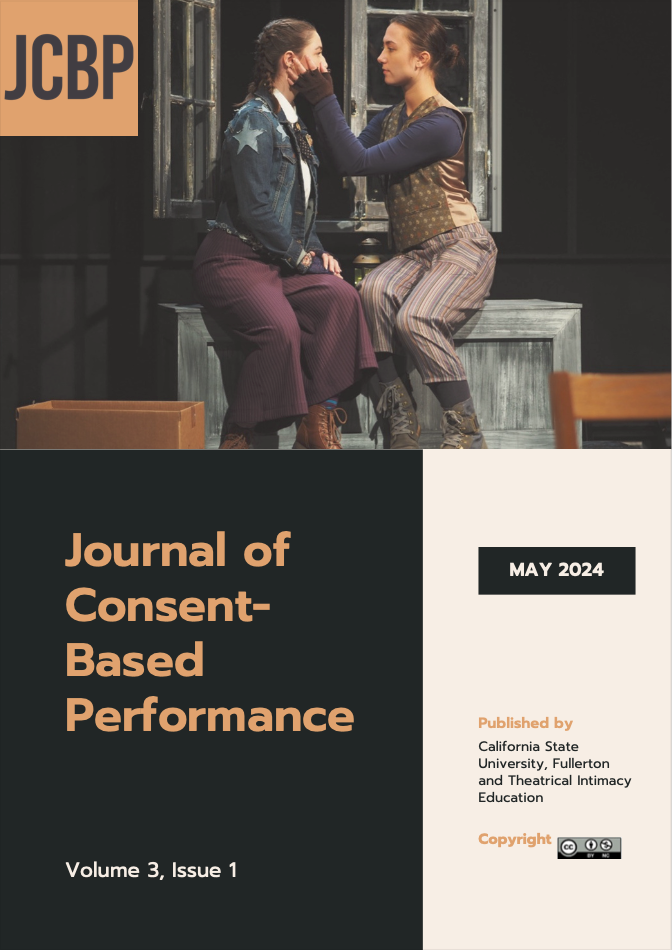
-
Front Matter
Cover
CFP
Table of Contents
Consent in Distinctive Contexts: Editor’s Note
by Amanda Rose Villarreal, PhD
-
Queering Neverland: A Dramaturgy of Care
Fiona Rose Murphey assistant directed a double-cast, queer production of Kimberly Belflower’s Lost Girl at American University, implementing a “dramaturgy of care”—an approach to integrating dramaturgical principles into a variety of theatrical disciplines. Using this approach, theatre makers of all stripes should make the time for deep text analysis, research (on the text and how it’s situated culturally, historically, and politically), discussions, and purposeful cross-role collaboration—from the prep and pre-rehearsal phase through a show’s opening. By putting this method into practice with Lost Girl, our creative team fostered a more thoughtful, caring process, as could anyone who keeps these principles in mind.
Read this Note From the Field by Fiona Rose Murphey
-
Boundaries Beyond the Bathing Suit: Utilizing Intimacy Choreography Practices to Support VIRTUS Training
A literature review and analysis evaluating how the practices of Intimacy Choreography align with the aims of the Catholic Church's abuse prevention programs collectively called VIRTUS. This article explores how the tools of Intimacy Choreography (Theatrical Intimacy Education, in particular) and VIRTUS both aim to establish and uphold boundaries, but in different capacities, arguing that Intimacy Choreography's consent-based practices can benefit Catholic diocesan schools' theatre programs that utilize VIRTUS training.
Read this Note From the Field Ky Gaskll
-
Intimacy in Improv: An Account of the Use of Consent-Based Practices in Non-Scripted Theatrical Explorations
Through the adaptation of trauma-informed pedagogy, intimacy and consent-based practices, and the use of self-care cues or safe words, this note recounts one lecturer's integration of Consent-Forward practice into their teaching in Higher Education in the UK.
This note introduces a useful flowchart for educators and facilitators of theatrical exploration processes and learning environments to use as a preliminary check to support consent-based content engagement.
Read this Note From the Field by Joshua Richardson
-
Participation as Intimate Act: Audience Reflections on Strategies of Consent in Roll Models
Immersive, interactive, and participatory performances often promise co-creative or otherwise unique roles for spectators, who may be called upon to directly interact with performers, explore performance sites, or help shape plot. The nature of much of this heightened participation is important to note: audience members might be expected to be visible onstage, make choices that affect the show, offer personal information, or engage directly with actors, in an ask for labor that is resultantly accompanied by increased risk, vulnerability, and relationality. This article uses the case study of Roll Models, a longform improv show that enacts a short adventure campaign in the style of Dungeons & Dragons on stage, in order to characterize audience participation as an intimate act. Building on previous scholarship aimed at assessing consent, intimacy, and participation in immersive theatre and live action role-play (Villarreal 2021, Biggin 2017, Machon 2013), we query not only into what participation, consent, and on-boarding processes were present in the performance, but also how audience members themselves viewed such mechanisms, understood and learned their role in the performance, and related to actors and each other.
-
Role-ing the Dice: Identity, Intimacy and Consent in Table-Top Role Playing
Tabletop roleplaying games are not new hobbies but have a distinct contemporary affiliation with pop culture. Many shows and podcasts feature popular TTRPG Dungeons and Dragons, among various additional games. These games have the powerful potential to examine identity, identity formation, and many personal issues through roleplaying potential. Collective storytelling and character development are cornerstones of this process. With this potential, it is important to realize the potential for negative experiences and tabletop spaces that could potentially cause more harm than good for players. This article examines the connections between TTRPGs and the intimacy process. Mainly exploring how intimacy tools such as the “button,” boundary practice, and consent-based world-building can significantly impact the game experience. As a result, I discuss how these processes additionally benefit the individual player. Ultimately, I argue that TTRPGs are strengthened through engagement with the intimacy process.
-
True Women as Sacred Friends: Harriet Jacobs's Model of Consent-Based White Allyship in 'Incidents in the Life of a Slave Girl'
Drawing from African American author and anti-slavery advocate Harriet Jacobs, this essay demonstrates that even well-intentioned white abolitionists can inadvertently reinforce racist systems. Jacobs sought help from white abolitionist Harriet Beecher Stowe to share her emancipation story, but received a response that exposed her past to Jacobs’s employer without consent. In her novelized memoir Incidents in the Life of a Slave Girl, Jacobs demonstrates the importance of Black voices and leaders in the abolitionist movement, showcasing feminist scholar Chandra Mohanty's concept of a “coalition” of women using their diverse positions to combat social inequities. By examining Jacobs's portrayal of the white women who aided her, I argue that Jacobs employs the rhetoric of true womanhood and sentimental novels to depict models of true allyship marked by consent-based sympathy. This essay delves into the nuances between sympathy and empathy in the context of nineteenth-century literature, referencing Gay Gibson Cima's assertion that these terms cannot be collapsed. By connecting Jacobs's use of sentimentality to Cima's differentiation between Black expressions of sympathy and empathy, this essay reveals how Jacobs strategically fosters empathetic connections between white and enslaved women, promoting a coalition of consent-based allyship in nineteenth-century abolitionist discourse.